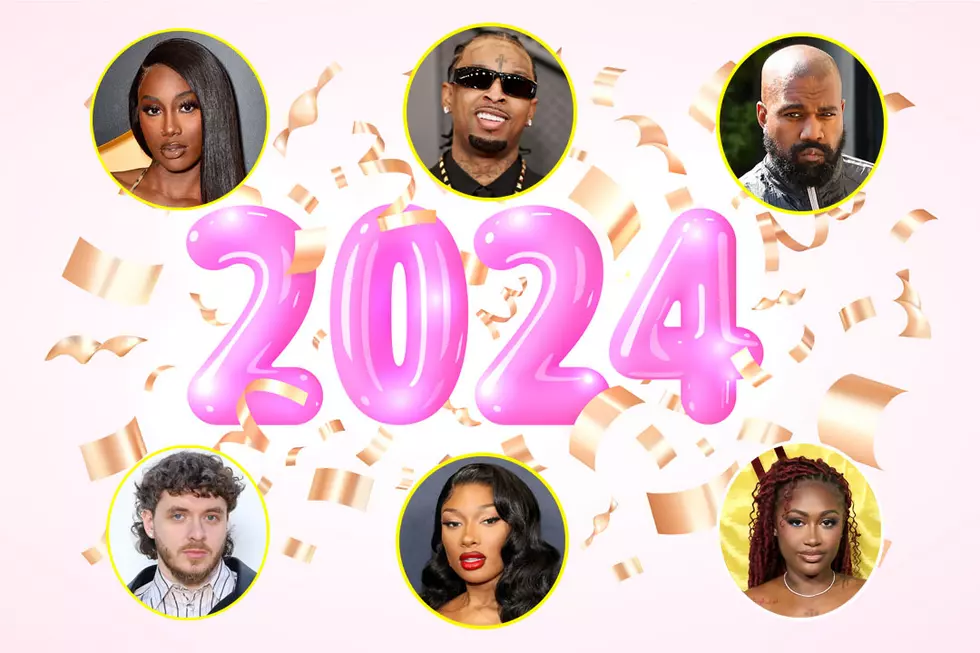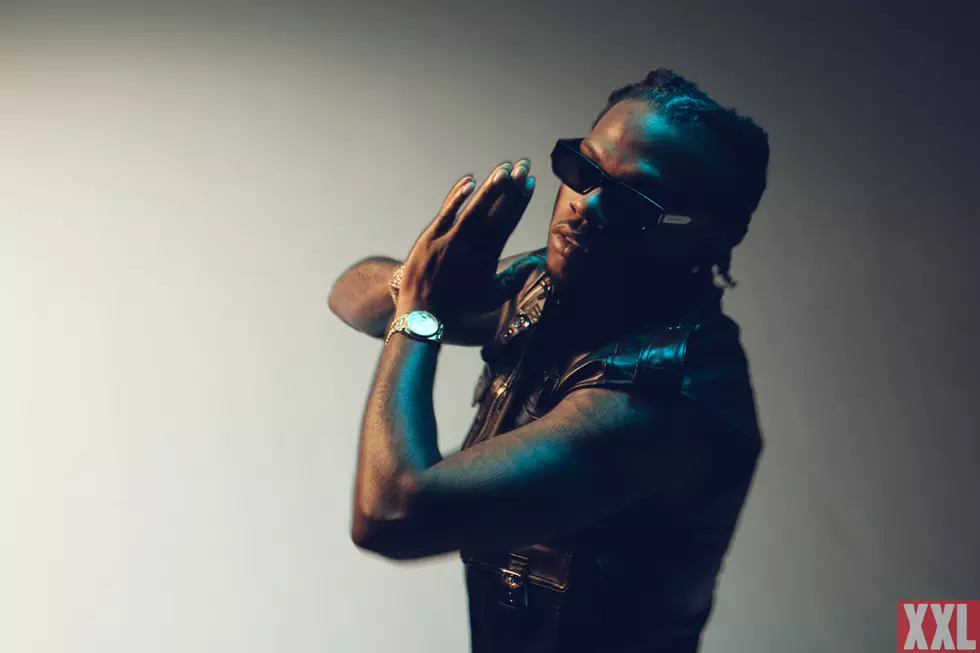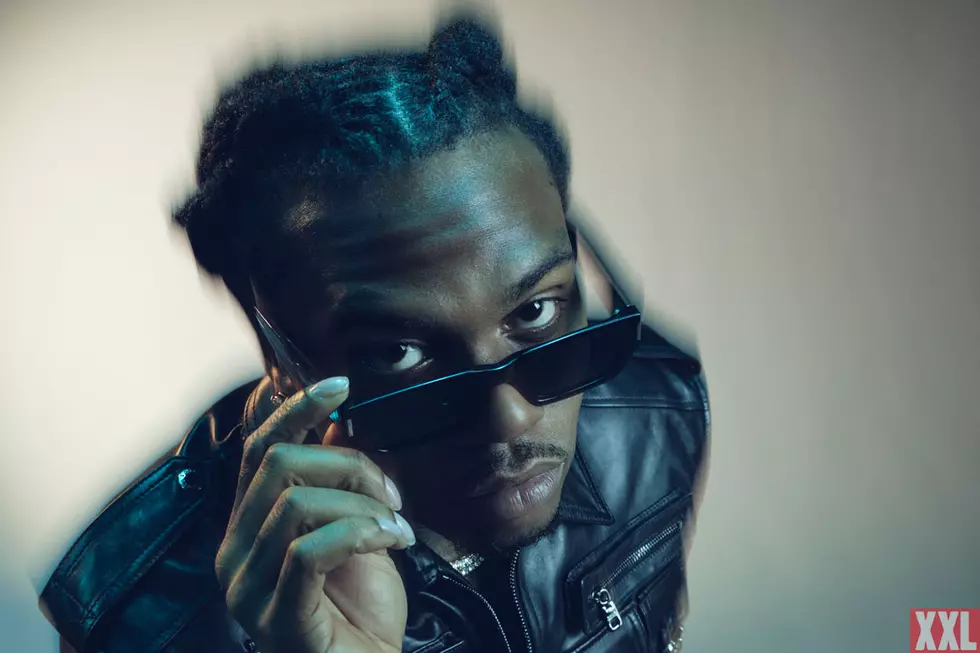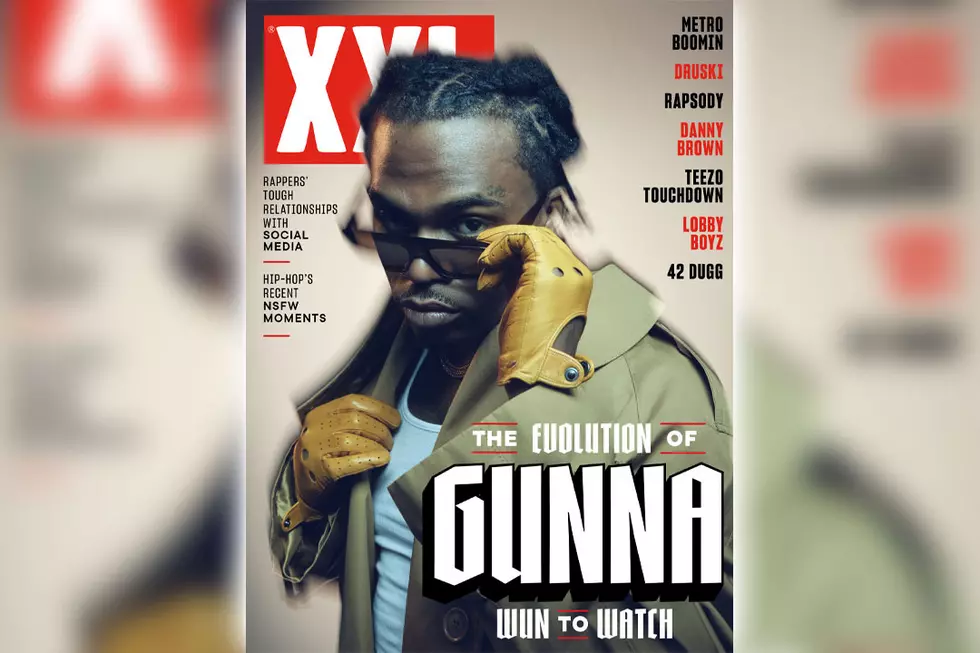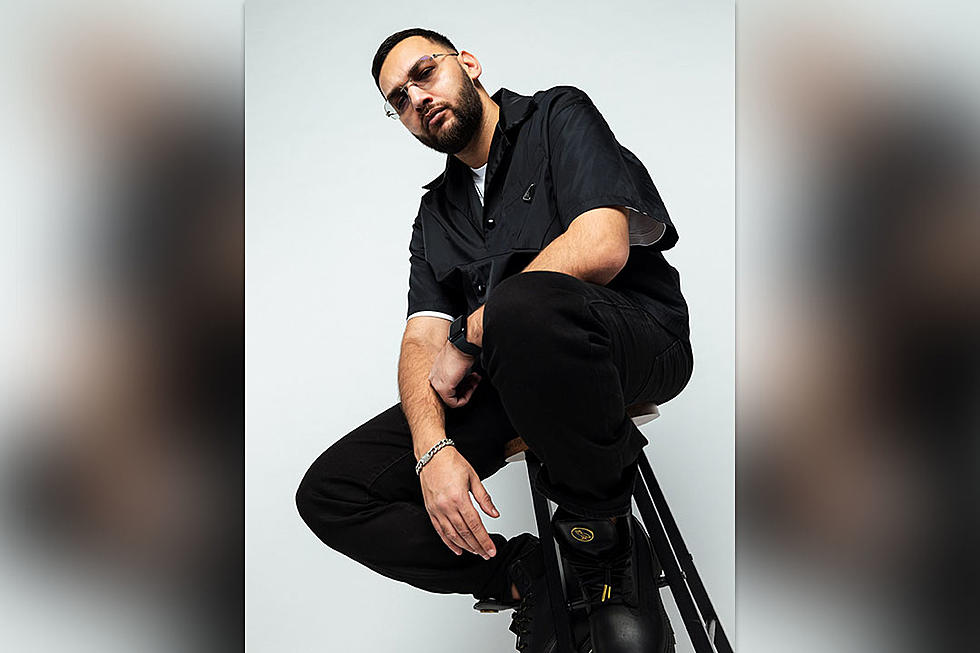
The Definitive Lil Boosie Story
For nearly five years Lil Boosie was locked up and fighting for his life and his freedom. He's won both those battles.
Words: Jeff Weiss
Images: Andrew Link
[This article originally appeared in XXL Magazine, Issue 154, June/July 2014]
There are no scented candles in solitary confinement. But there’s one flickering in a fourth floor suite at the W Hotel in New Orleans. It’s a custom-made Lil Boosie votive candle with the Baton Rouge rapper’s name inscribed in gold gothic script like a Holy Ratchet Emperor.
It’s the late morning of March 10, less than a week since Boosie left the Louisiana State Penitentiary, where he served nearly five years for multiple drug convictions and a first-degree murder rap that he beat. His “Boosie Speaks” press conference doesn’t begin for two hours, but the luxury hotel lobby is already littered with family, journalists, label reps, hangers-on, Webbie (Boosie’s rap partner), Jeezy and Bun B.
The ruler’s back. That’s the message that his record labels, Trill Entertainment and Atlantic Records, attempt to convey down to the cartoonishly regal throne supplied for the live-streaming press conference. But Boosie didn’t receive thousands of adoring fan letters in jail because of his imperial temperament; he got them because he’s the hood’s ambassador, an anguished rebel from the gutter and purple-smoking avatar for the struggle.
“I got around 100 letters each day until the day that I left prison,” Boosie, 31, laments in this shadowy room on the hotel’s fourth floor. “I couldn’t get enough stamps to write everyone back. The letters came from Chinese people, White people, Black people, rich kids, ghetto kids. All over the world.”
His presence is almost ghostly, considering how frequently his freedom was delayed and how grave the accusations were. He jokes, “I had more release dates than Jordans.”
But now that he’s back, missing him is impossible. Weightlifting and a starchy prison diet have given the once-slim rapper the physique of a middleweight boxer. A gold watch—the size of a CD—glitters on his wrist. It’s the same one he nearly fractured punching prison walls in frustration. Two diamond-encrusted chains dazzle from his neck. He’s wearing dark pants, darker sunglasses and a black leather vest that reads “Fly.” The look is All Eyez On Me for the Instagram age.
The half-decade in hell caused Boosie’s Eazy E-as-an-Animaniac voice to descend an octave. He’s acquired a razorblade blues rasp, amplified when he says things like: “If you can understand reality, you can understand my music.”
The numbers of those who understood multiplied in his absence. He became a folk hero hovering somewhere between 2Pac and Lead Belly (a one-time inmate of the Louisiana State Penitentiary, a.k.a. Angola because of its location in Angola, La.). Being acquitted of murder conspiracy charges in the notoriously racist Louisiana criminal justice system may have burnished his myth, but the music built it.
During the last decade, Boosie unleashed over a half-dozen official albums, twice as many mixtapes and innumerable scene-stealing cameos (“Wipe Me Down” remix, “Independent”). What he lacked in top 40 hits, he compensated for with often poignant and always profane anthems to baby mamas and corrupt police offi cers, distant lovers and Levi’s. Like 2Pac, Boosie’s music possesses a raw emotional power that makes you instinctively equate your struggles with his own. And the publicity from his trial coupled with the sudden shortage of new songs allowed a generation to catch up with what had formerly been a street underground and Southern phenomenon.
“I’d heard my buzz had grown, but there’s a difference between hearing it and seeing these Instagrams and Free Boosie tattoos,” Boosie says. “I feel like 2Pac because when he came home, it was his time. I feel like it’s my time now.”
In the other L.A., YG, DJ Mustard and Ty Dolla $ign blew up off “ratchet music” and have openly paid homage to Boosie in records like YG’s “Who Do You Love?” which is based off of a Boosie song of the same name. In March 2014 LeBron James tweeted about being “locked in listening to Lil Boosie.” In September 2013 Rick Ross said in an interview on NYC’s Power 105 that he’d have a bag of money waiting for Boosie upon his arrival home. At the press conference, Bun B compared Boosie to Nelson Mandela. It was obviously hyperbolic, but afterward, the Houston underground king elaborated.
“Boosie means freedom to people. He’s fearless and speaks for those struggling that can’t speak for themselves,” Bun B says before the press conference. “People don’t appreciate you until you’re not there, and many people didn’t understand how impactful Boosie was in the hood and streets until now. A lot of rappers tried to fill that slot, but no one can be Boosie.”
In Baton Rouge, routine traffic stops often result in a decade behind bars. That’s what happened in October 2008 when the sheriff’s department discovered a bag of weed, a rolled blunt and gun in Boosie’s Dodge Challenger. “They tried to lock me up for 10 years,” Boosie says, describing his third marijuana offense arrest with disgust. “No rehab…just straight to the penitentiary.”
A guilty plea reduced the sentence to four years in a medium-security prison, of which Boosie was expected to serve half. But after roughly six months, a June 2010 grand jury indictment transformed Boosie’s saga into rap’s incarnation of The Wire. The district attorney blamed Boosie, 17-year-old hitman Michael “Marlo Mike” Louding and several others for a 2009 killing spree that terrorized the South Side of Baton Rouge. Shortly after Louding’s arrest, the teenager, a Baton Rouge affiliate of Boosie’s, admitted to six of the slayings.
One murder victim was Terry Boyd, a recently paroled convict whose brains were blown out while sitting on the couch in a friend’s house in Baton Rouge. In a videotaped confessional, Louding claimed Boosie paid him $2,800 for the execution, which left no fingerprints, witnesses or clear motive. (In 2013, Louding was convicted of killing Boyd and sentenced to life in prison.)
After Boosie’s incarceration, authorities alleged that Louding became a freelance contract killer so cold-blooded that he gunned down Boosie’s best friend, Darryl “Bleek” Milton, assassination-style and Milton’s associate Charles Matthews while they were parked in a black Cadillac between the railroad tracks and the Mississippi River. Afterward, Louding showed up to the funeral and hugged Bleek’s mother in consolation.
The lurid accusations brought national headlines and local obsession. Boosie was transferred to Angola, the converted plantation where most inmates serve life sentences for violent crimes. Prosecutors announced that he’d face the death penalty.
Behind the barbed-wire cage, “Lil Boosie” did not exist. Even his government name, Torrence Hatch, was swapped for prisoner identification No. 560699. He spent much of his 52-month bid in solitary confinement.
“I was a ticking time bomb, spitting on guards…so angry,” Boosie says, his teeth unconsciously clenching. “What’s another two or three months when you’re potentially facing death in jail?”
His troubles multiplied after judges added eight years to his sentence following a foiled plot to smuggle weed, ecstasy and codeine into prison in November 2011.
“I started having nightmares about never getting out of prison, nightmares about when they killed Bleek,” Boosie says, his voice trailing off. The wounds feel fresh in the retelling.
Back in Baton Rouge, cops continually hounded his aunts and cousins. One random woman even told his 7-year-old daughter in a Wal-Mart that her dad would die in jail.
“The guards were hateful,” he adds. “One day, a guard woke me up to say, ‘I’ll be glad when they gas your Black ass. I’ll be glad when they stick that needle in your arm.’”
Boosie’s two-week trial occurred in May 2012. By now, the death penalty threat had been replaced with a potential life sentence. But the prosecution’s case quickly collapsed after Louding recanted his confession on the stand. Their evidence against Boosie was entirely circumstantial, including sinister lyrics that they claimed illustrated a homicidal state of mind.
The defense closed its case without calling a single witness. Within one hour of deliberation, the jury reached a unanimous not guilty verdict. But Boosie says that the acquittal only intensified the degradations. With time still ticking on his previous drug sentences, Boosie was frequently banished by the guards to solitary confinement, where he was only allowed outside of his cell for minutes a day.
“A lot of people held me down, but I was strong,” Boosie says, shouting out the support he received from his family, the NAACP and Webbie, Jeezy and Yo Gotti. The latter pair helped foot the bill for one of his attorneys. “I always smiled to keep from crying. Being in the hole for so long…that’s when I could let my pain out and express myself better.”
Boosie wrote a memoir, a screenplay and over a thousand songs while locked up. In an eff ort to reduce the drug sentence he was serving, Boosie completed classes in parenting, substance abuse, anger management and victim’s awareness. His most proud achievement was obtaining a high school G.E.D.
“I’ve put my mama through a lot my whole life, so I wanted her to see me walk across the stage,” Boosie says beaming, flashing his gold-capped teeth. “She was happier at that moment than when I’d bought her Rolexes and cars.”
During his last 10 months at Angola, Boosie’s record was spotless. The agonizing final weeks offered one more chance to contemplate his mistakes and victories, what set him on his path and how easily it could have been rerouted. He pored over his old record contracts and consumed books on the music industry. But mostly, he memorized the Bible. Psalms 41 was his favorite. Each night he’d reread it, letting the benedictions offer consolation and consider how close he’d come to the abyss.
Blessed is he that considereth the poor…The Lord will preserve him, and keep him alive; and he shall be blessed upon the earth: and thou wilt not deliver him unto the will of his enemies. All that hate me whisper together against me: against me do they devise my hurt.
Boosie hadn't had butterflies since his first show at 15 years old. But when the warden woke him up and told him to pack up his belongings on March 5, the jitters returned. They were still there when he drew his first free breaths outside Angola, when he rapped a freestyle in the car ride home, all the way until he made it to Baton Rouge, where he scooped up his seven children. The family’s “Free Boosie” chants were so loud that they had to leave the city rapidly, lest word disperse and mobs form.
“Boosie coming home was like putting a Bat Call in the air—everyone knows it’s that time to turn up,” says DJ Ya Boy Earl, Baton Rouge’s most popular DJ. “You might hear 20 Boosie songs in the club on any given night. Rappers are starting to come out of the woodwork. We see Boosie out of jail making millions and making his dreams come true, and it feels closer for us.”
Despite the torch that still burns, Boosie knows that he’s a moving target in his hometown. He mentions the need to go to a city where he isn’t the only young Black man in a Bentley. Maybe Atlanta. Probably New Orleans. For now, he’s renting Cash Money co-founder Bryan “Baby” Williams’ mansion in a New Orleans gated community.
Boosie’s free time is consumed by family and recording. He says that his next album will be a double-disc; one side is already recorded and includes beats from DJ Mustard and Mike Will. Boosie’s trying to launch a clothing line, lock down endorsement deals and expand the legend. In the interim, shows are booked almost every weekend throughout the Southeast.
When asked what’s different in the aftermath of the chaos, Boosie says that nothing’s really changed but the money. But this is the nonchalant play-it-cool answer. He mentions how drugs are no longer a temptation. All he has to do is think about going back to Angola and disappearing again until he dies. After this, no more chances remain.
“What I’ve been through just gives me more stories to tell. I’ve got a drive for success in me now. I want to show people that you can’t stop me,” Boosie says, pausing for a second and repeating his words with slightly more force. “You can’t stop me, man.” ♠
More From XXL


